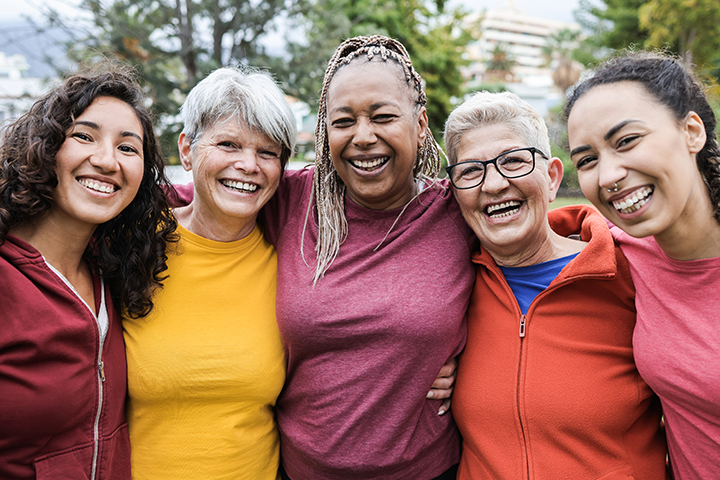It’s a dreaded topic for some. We all age. Aging affects everything from our teeth to our toes, and it’s important to stay healthy if you want to age gracefully. Here are some tips to live well into your golden years.
Make Heart Health a Priority
As you age, your cardiovascular system changes. Some of the most common changes affect your arteries and blood vessels. They begin to stiffen, which makes it harder for your heart to do its job. Your heart will adjust to the extra work it takes to pump your blood, but it won't work the same as it used to. Instead of increasing during exercise or activity, it stays about the same as it is at rest. This puts you at greater risk for high blood pressure or other heart problems.
There are several things you can do to keep your heart healthy and at peak performance as you age:
Stay active: Physical activity is one of the keys to the fountain of youth. Work in at least 150 minutes of moderate aerobic activity each week to help your heart beat strong. Plus, it lowers stress and keeps the extra pounds off!
Eat a healthy diet: Choosing high fiber foods, fruits, vegetables and lean protein helps you stay healthier longer. Avoid foods high in saturated fat and salt.
Prioritize sleep: Quality sleep helps your body heal and repair itself, including your heart and blood vessels. Aim for around seven to nine hours a night.
Stop smoking and limit alcohol: Cigarette smoking and drinking too much alcohol can increase your risk for heart disease, raise your blood pressure and increase your heart attack risk.
Keep your numbers in check: Ask your health care provider about your blood pressure and cholesterol levels. Take steps to lower them if they're high. Knowing your numbers will also help reduce your risk for heart disease, heart attack and stroke.

Bones, Joints and Muscle Health
As you age, your bones shrink in size and density, causing them to weaken. Muscles also tend to lose strength, and this can lead to risk of falls, broken bones and other problems. Help your bones and muscles stay healthy:
Get enough calcium: Calcium is essential to keep bones healthy. Women 51 and older should get at least 1000 mg of calcium a day. You can get calcium through dairy products, calcium supplements and other foods in your diet.
Get enough Vitamin D: Vitamin D works alongside calcium to keep bones healthy and strong and protect muscles. Adults up to age 70 should get 600 international units of vitamin D per day. If you’re over 70, aim for 800 IU a day. You can also get vitamin D from direct sunlight exposure and a healthy diet.
Stay active: Physical activity helps more than your heart—it slows bone loss too! Weight bearing exercises help you build strong bones.
Avoid or limit alcohol and don’t smoke: Just like your heart, your bones benefit from stopping smoking and limiting or avoiding alcohol.
Bladder Health
Your bladder changes as you age, becoming less elastic. This may cause incontinence or more frequent urination. Some things you can do to keep your bladder healthy include:
maintain a healthy weight
do pelvic floor exercises to strengthen your muscles
avoid bladder irritants like alcohol, caffeine, spicy food, and carbonated drinks
Memory
As you age, your brain does, too. That can bring small changes in memory and thinking skills. You may find yourself struggling to find the words for something or you might leave things in places they don’t normally belong. There are a few things you can do to improve your brain health:
Stay active. Exercise and activity help more blood go to your brain. It can also reduce stress and depression which can affect your mind and memory.
Stay mentally sharp. Challenge your brain with some memory and thinking skills! Learn a new hobby, take classes or read more to strengthen and sharpen your mind.
Stay social. Spending time with others or getting out in the world and meeting people can help you feel better, lower your stress levels and keep depression away. That’s a good thing because your mental state and mood can affect your memory.
Check Your Eyes and Ears
As you get older, your eyesight and hearing may decline. You might be more sensitive to bright or dim light or reading up close. You might have trouble hearing a conversation in a crowded space. Talk to your provider if you’re worried or bothered. There are treatments and tools to make your life easier as your eyes and ears change.
Resources for TRS-ActiveCare and TRS-Care Standard
Wellness Coaching
Work one-on-one with a nutritionist or fitness expert, improve your blood pressure or cholesterol and stop smoking or take a self-guided course. Those are just a few of the programs available to you at no cost through your TRS health plan’s Wellness Coaching program.
Fitness Program
Get moving with the Fitness Program. Choose from a nationwide network of fitness locations at a discount. There are many options to fit your lifestyle and budget.
Resources for TRS-Care Medicare
Let's Move by UnitedHealthcare
Let's Move by UnitedHealthcare is here to help keep your mind, body and social life active – at no additional cost to you. With simple resources, tools, events and personalized support, Let’s Move helps you explore ways to eat well, stay connected and be financially, physically and mentally fit — all at no additional cost to you. To explore, visit letsmovebyuhc.com through your member website. You can also participate in live, virtual events to learn how to cook healthy meals, be physically active and explore other wellness topics by visiting the events page. 2025 Events - Let’s Move Virtual Events